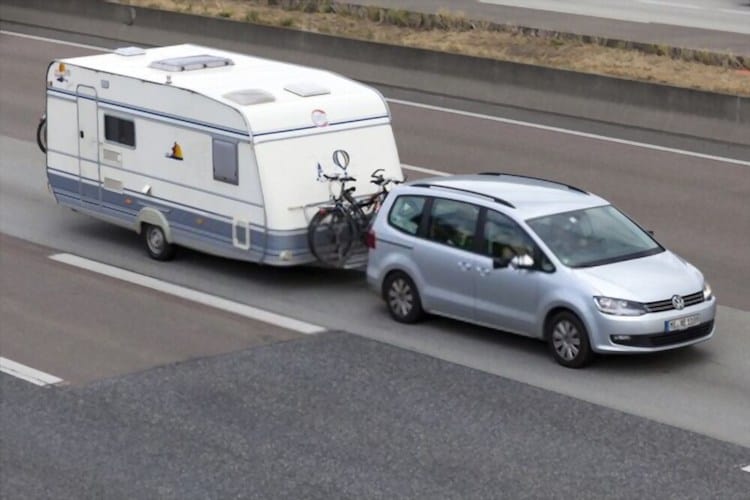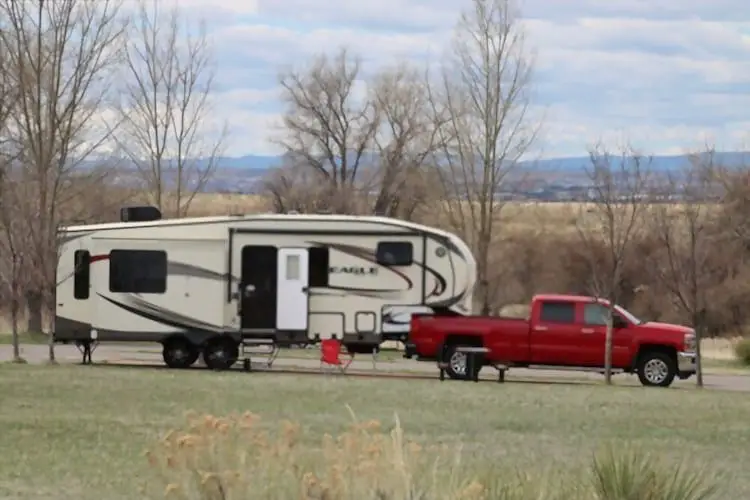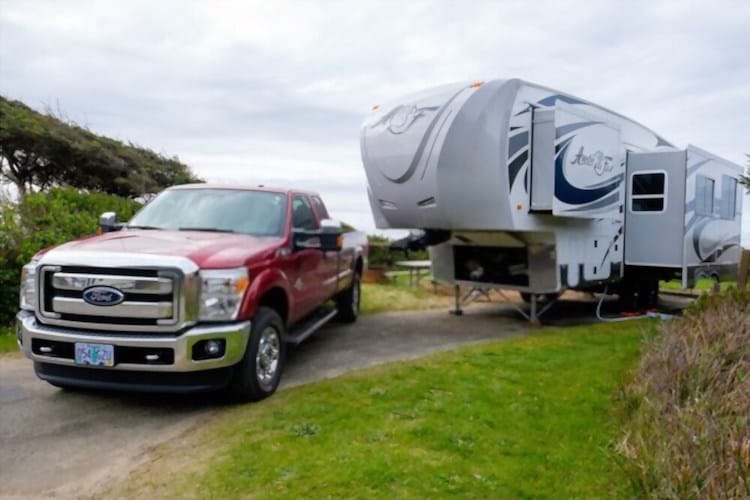Published Date: August 11, 2020
Last Updated on December 24, 2022 by Camper Front
This is actually a highly debated topic, 5th wheel towing vs conventional towing, which is better? But it all boils down to your type of RV vehicle, the overall weight, and your personal preference.
Essentially, 5th wheels have multiple levels and higher ceilings, and the pin weight of your trailer is evenly distributed over the back axle of the truck, this gives the driver more steering control, however, it’s only suited for big trailers over 28 inches.
Conventional towing, on the other hand, is suitable for small trailers and has more storage space.
Let’s quickly compare the 2 travel trailers below:
Table of Contents
Traveling With 5th Wheel Towing Vs Conventional Towing
5th Wheel Towing
A fifth wheel doesn’t mean the vehicle comes with five wheels; it simply means it has a hitch mechanism that connects the tractor to the trailer.
When you tow a trailer with a pickup truck, for the most part, you are essentially using a trailer with a hitch and a hitch coupler. A fifth wheel essentially replaces the hitch.
The major benefit of a fifth wheel is the turning radius which is very visible when the truck is backing up.
With a fifth wheel, the weight placed on the truck is evenly distrust between the rear axle and the cab, which eliminates the pivot point and helps to spread the load, giving the driver more control, although the rear end still bears the impact of it.
But this helps to ensure that the dynamics of your tow vehicle are affected less as compared to when a trailer is hooked up to the rear.
Fifth wheels, unlike conventional tow vehicles, require more maintenance to operate. Still, they are mechanisms, not machines, so you don’t really need to worry about them breaking down — but they need constant lubrication to prevent them from malfunctioning.
So ensure to always keep a generous amount of lube on the lube plate or top of the 5th wheel. Also, make sure the lube plate is free from any obstructions before coupling the trailer.
Conventional Towing

Conventional towing makes use of the tow ball of the vehicle while remaining within the tow vehicle’s weight limits.
This method is unlike towing arrangements that unconventionally tether to the vehicle’s chassis or body.
This type of “towing-on-the-ball” arrangement involves pull-behind towing and towing that uses a tow ball, pintle hook, or any similar configuration that consists of a shank and receiver hitch.
It should also be noted that weight-distributing hitches for three-quarter ton pickups and larger are also filed under “conventional towing.”
Conventional towing has been around for many, many years. And there have been huge improvements in the actual hardware and hitches and setups, which have added a lot of huge safety factors, which makes conventional towing a great experience.
There are a number of bumper systems available which you can choose from depending on the weight and size of your travel trailer; they have an excellent traditional weight distribution and sway bar setup.
Differences Between 5th Wheel Towing and Conventional Towing

Storage
When it comes to truck bed storage space, a conventional tow trailer can be your best option because a 5th wheel uses up your entire truck bed.
If you want to bring items like a boat, a bike, or other space-consuming items, a 5th-wheel trailer isn’t for you.
Cost
5th wheel trailers are way more expensive than conventional towing, and there isn’t much difference that justifies the massive price increase.
Yes, It has a different connection and needs a little more engineering to get the raised piece above the truck bed, but It still doesn’t justify the 5th wheel’s exorbitant price.
Ventilation
5th wheel comes with an extra space over the truck bed and has very tall ceilings. There are also many levels of stairs in a 5th wheel.
The larger space, combined with a more segmented area, causes major troubles with heating and cooling. Many owners of a 5th Wheel complain about uneven cooling in a 5th wheel compared to a travel trailer even when the length behind the tow vehicles is the same.
This is not to say that every 5th wheel experience the same problem. Some do not, but many many 5th-wheel owners complain of an extremely hot bedroom area, especially on the upper level.
Backing Up
It’s worth noting that the person behind the steering wheel has a significant impact on how easy it is to back up your towing trailer. Someone with much experience and expertise will find it easy to back up any vehicle, whether it is a 5th wheel or a conventional towing trailer than a person with lesser experience.
The only difference is that a conventional towing trailer tends to overreact to minor movements in the steering wheel. So, you have to learn not to overcompensate, lest, you end up with some wild angles when backing up.
A 5th wheel, on the other hand, has the opposite problem. It requires larger wheel movements to turn, so it often ends up pushing the truck end too far one way and throws off the angle.
5th Wheel Tow Receiver
Not only does a 5th wheel take up space in your truck bed when towing, but it also takes up space when you’re not towing. The 5th wheel tow receiver is a very huge and heavy chunk of steel.
Either you have to go through a lot of work to remove it from the truck bed after every trip, or you have to keep it in there and use up most of your truck bed for a tow hitch. A conventional towing trailer, on the other hand, takes up no space at all.
Conclusion
Hopefully, this article has helped to shed some new light on the debate over the 5th wheel towing vs conventional towing behind travel trailers and what would work best for you.
As I stated in the beginning, it all depends on your personal choice and what works best for your style of camping, have fun!

